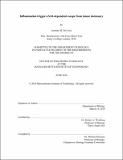Inflammation triggers Zeb1-dependent escape from tumor dormancy
Author(s)
De Cock, Jasmine M. (Jasmine Morgan)
DownloadFull printable version (24.07Mb)
Other Contributors
Massachusetts Institute of Technology. Department of Biology.
Advisor
Robert A. Weinberg.
Terms of use
Metadata
Show full item recordAbstract
Metastasis-related mortality for breast cancer patients often occurs many years after treatment of the primary tumor. Inflammation, through the orchestra of immune cells and released inflammatory cytokines, can predispose certain tissues to cancer development and can create a favorable environment for metastatic outgrowth. I evaluated whether lipopolysaccharide (LPS) could induce an inflammatory response, leading to the activation of the cell-biological epithelial-mesenchymal transition (EMT) program in dormant disseminated cancer cells in vivo, and subsequent metastatic outgrowth. To model metastatic cellular dormancy, I used a dormant subpopulation of cells (D2A1-d) that were enriched for in vivo from the highly metastatic carcinoma cell line D2A1, that was derived from spontaneous murine mammary tumor. The ability of the EMT program to awaken dormant disseminated D2A1-d cells was directly assessed in vivo, which resulted in the formation of macro-metastases following a transient induction of either the EMT-transcription factor Snail or Zeb1. Furthermore, the transient induction of Zeb1 led to the generation of CD29+ CD24- metastasis-initiating cells. In mice bearing dormant disseminated D2A1-d cells, my findings demonstrated that LPS-treatment resulted in the awakening of D2A1-d cells and metastatic outgrowth in the lungs and bone. The awakening of dormant disseminated D2A1-d cells was dependent, albeit through unknown mechanism, on the presence of neutrophils. The LPS-mediated awakening of dormant disseminated cancer cells was also dependent upon the activation of the EMT-inducing transcription factor Zeb1 in the D2A1-d cells. In conclusion, my thesis work demonstrated that inflammation can trigger the escape of metastatic dormancy in vivo.
Description
Thesis: Ph. D., Massachusetts Institute of Technology, Department of Biology, 2016. This electronic version was submitted by the student author. The certified thesis is available in the Institute Archives and Special Collections. Cataloged from student-submitted PDF version of thesis. Includes bibliographical references (pages 167-181).
Date issued
2016Department
Massachusetts Institute of Technology. Department of BiologyPublisher
Massachusetts Institute of Technology
Keywords
Biology.